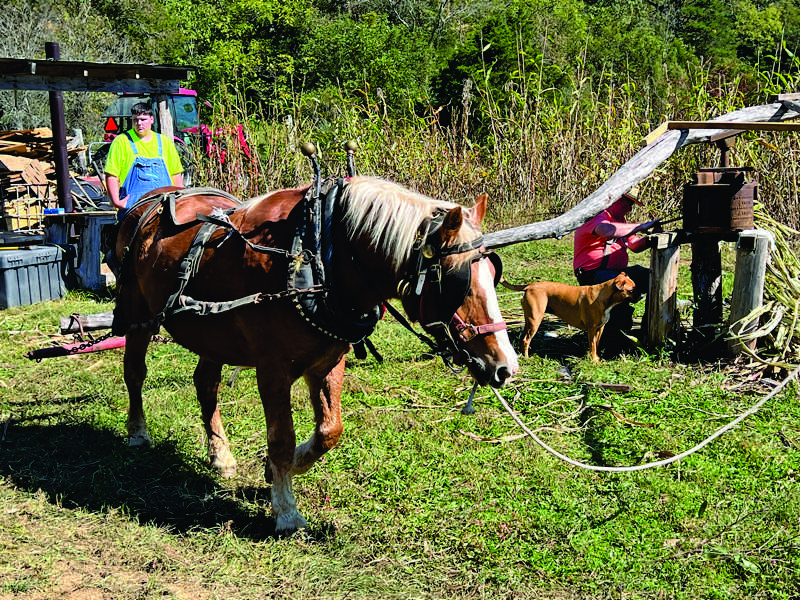Sorghum sweetness flows at Stooksbury

Bobby Stooksbury prepares to feed sorghum cane stalks into the mill pow- ered by draft horse Ethel to make sorghum syrup on Saturday at the Stooks- bury Sorghum Mill in Andersonville. Looking on is helper Lincoln Hodge. (photo:G. Chambers Williams III )
Draft horse Ethel was out in the field this year to power the mill for the sorghum cane grown every year on the farm, at Stooksbury’s Sorghum Mill, 514 Park Lane, just before the intersection of Red Hill Road.
Ethel provides the power to grind up the sorghum stalks to extract the juice that is simmered in a pot over an open fire to become sorghum syrup, also known as sorghum molasses.
Bobby Stooksbury, the farm’s owner, said he uses techniques he’s learned and developed over 30 years of honing his craft.
The dark syrup he makes from the cane has been an Appalachian tradition for centuries, and Stooksbury shows it off both at his farm and at the Museum of Appalachia on Andersonville Highway every fall.
Visitors can see the operation on his farm from 10 a.m. to 4 p.m. every Saturday this fall, as either Stooksbury or his nephew, Kyle Buckner, feeds the cane stalks into the mill to extract the juice into a bucket underneath it.
In the nearby wood-fired cooker, the cane juice is slowly boiled down to make the thick molasses syrup.
It’s bottled and sold for $10 a pint as “Gooseberry Hollow Sorghum Syrup.”
It takes about 10 gallons of the juice to make a gallon of the syrup, Stooksbury said.
Sorghum syrup differs from regular molasses in that it comes from sorghum cane, which grows easily in the Appalachian climate, Stooksbury said.
Regular molasses is a byproduct of making sugar, and comes from sugar cane, which does not grow in the cooler climate of Appalachia.
It’s grown in more-temperate climates, such as from Louisiana down into the Caribbean area.
The sorghum syrup is often served with biscuits and used to sweeten cookies and other treats, Stooksbury said.
At his farm, he sells the syrup along with barbecue sauce made by his business partner Alan Conrad.
“We make about 100 gallons of the sorghum syrup every year here on the farm,” Stooksbury said.
It takes about three hours to make the syrup from the raw cane juice. One acre of sorghum cane can make up to 150 gallons of the syrup, Stooksbury said.

